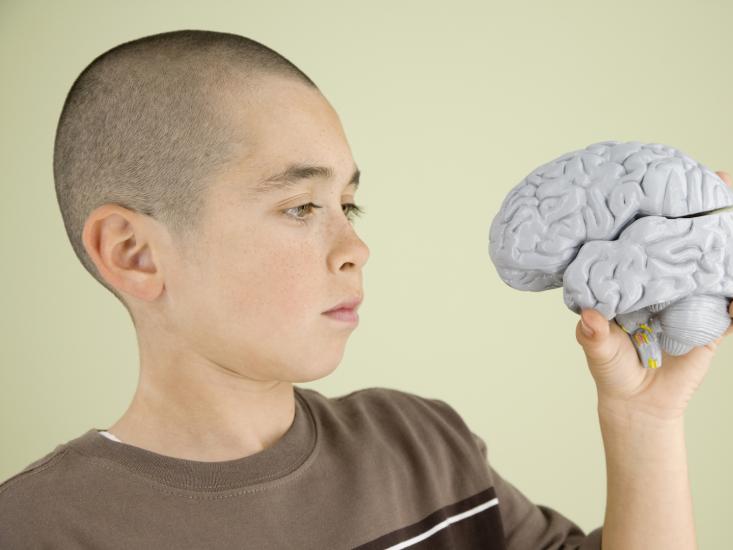In a new commentary, researchers discuss the evidence that antipsychotic medications may cause brain atrophy—especially in children, whose brains are still developing. The article was written by Tarun Bastiampillai, Peter Parry, and Stephen Allison at Flinders University in Australia, and was published in the Australian and New Zealand Journal of Psychiatry (ANZJP).
 The authors write that it is accepted wisdom in psychiatry that children are more susceptible to the adverse effects of second-generation antipsychotics, such as obesity, diabetes, and sedation. However, the brain changes brought on by antipsychotics are a more controversial subject. Some psychiatrists have suggested that psychosis itself is responsible for brain atrophy and that medications may protect the brain by reducing symptoms.
The authors write that it is accepted wisdom in psychiatry that children are more susceptible to the adverse effects of second-generation antipsychotics, such as obesity, diabetes, and sedation. However, the brain changes brought on by antipsychotics are a more controversial subject. Some psychiatrists have suggested that psychosis itself is responsible for brain atrophy and that medications may protect the brain by reducing symptoms.
Unfortunately, according to Bastiampillai, Parry, and Allison, this doesn’t fit with the research findings. They cite a study from 2011 in which longer duration of antipsychotic use, and higher dosage of antipsychotic medication, were both associated with brain volume loss. The researchers controlled for confounding factors, such as duration of psychotic “illness,” severity of “symptoms,” and substance abuse. This suggests that “illness severity” cannot be used to explain that loss of brain volume.
Likewise, studies in both monkeys and rats show that when healthy animals are exposed to antipsychotics, they lose an average of 8-11% of their brain volume, especially in the frontal cerebral cortex. The researchers tested both haloperidol and olanzapine, meaning that this effect was found for both first-generation antipsychotics and the newer, second-generation antipsychotics.
These findings are especially troubling in light of recent evidence that children are prescribed antipsychotics in the absence of any psychotic symptoms—and in most cases, without any mental health diagnosis at all.
The authors cite a 2015 article in JAMA Psychiatry in which researchers reported that “most young people treated with antipsychotics did not have any diagnosis recorded in their health care claims data”—meaning that children are being prescribed antipsychotics as a behavioral control, rather than to treat a diagnosed condition.
Olfson, King, and Schoenbaum—the authors of that 2015 article—write that these behavioral problems are developmentally limited, meaning that most children will likely learn better ways of coping and behaving, without the need for medications with dangerous, common side effects and which may be damaging children’s developing brains.
****
Bastiampillai, T., Parry, P., Allison, S. (2018). Can antipsychotic medication administered for paediatric emotional and behavioural disorders lead to brain atrophy? Australian & New Zealand Journal of Psychiatry, 1-2(4867418797419). doi: 10.1177/0004867418797419. (Link)















Psychiatrists use negationism to defend their point of view. They deny that neuroleptics were introduced into psychiatry because they had the same effects as the lobotomy. They deny animal research and research on humans. They use the same tactics as the far right, who deny the existence of gas chambers to protect Hitler.
With the use of neuroleptics and chemical castrators in US concentration camps for migrants, the latent eugenics, scientific negationism, filiation with Nazism is transparent. These people deserve to be judged and condemned mercilessly.
Report comment
Huge doses of potent antipsychotics flow into FL state jails for troubled kids https://web.archive.org/web/20180929120210/https://www.palmbeachpost.com/news/state–regional/huge-doses-potent-antipsychotics-flow-into-state-jails-for-troubled-kids/Q5KorrmHDBZqY2AyPL8ZJJ/
This is a little more recent https://www.publicsource.org/pa-juvenile-offenders-given-psychiatric-drugs-at-high-rates/
And this I hit a dead end http://www.kcur.org/post/case-over-psychotropic-drugs-given-missouri-foster-kids-now-class-action-lawsuit latest I could find its JUL 20, 2018
Report comment
thanks cat….what a terrible problem…thanks peter…
giving anti-psychotic drugs for non-psychotic problems…
Report comment
Physiology 101: under-utilized body tissue will atrophy. This is true for the brains of sedated adults as well as sedated children. Psychiatry’s new “brain volume” hypothesis is wrong to label evidence of this iatrogenic HARM as a symptom of a mythical disease.
Report comment
Nancy Andreasen proved in her 2007 study that so-called schizophrenia is not the cause of brain shrinkage. She is the god mother of biopsychiatry and yet she had enough guts and moral fortitude to admit that it’s the neuroleptics that cause human brains to shrink. She even carried out her study twice because she thought she’d made a mistake when the study showed that the drugs were the cause of the problem and not the supposed “disease”. Then she sat on the results for two years because she didn’t want to publicize them. And then she finally published the study. But then she said that it is important for people to continue to take the damned drugs! Go figure.
Report comment
She said that it is important for people to continue to take the drugs. Know why?
She prefers the destruction of our brains and lives to the loss of her job. That’s why.
Report comment
This is the thing that interests me a lot. She knows the truth after proving it twice with her studies. She stated her findings and said that you couldn’t dispute them. And then she chooses to spout the same old line that psychiatrists always use about “having to take your medicines”. How do they live in such a conflicted world without becoming mad themselves? Is money and power so important to them that they can lie to themselves even after seeing the truth right there in front of them? I just don’t understand it at all.
Report comment
All medicines cause some harm while treating diseases. Psychiatrists believe in the myth of “mental illness”- that emotional suffering is a disease causing a lack of “sound judgment.” This false foundation is the root of all their harm.
Report comment
neuroleptics are tranquilizers with lobotomy-like effects. over the long haul, expect brain damage. if i recall correctly, the very early data on Thorazine is mentioned in Mad in America (the book), and that’s pretty much what the shrinks wrote…”chemical lobotomy,” potential for brain damage. and yet…
The various drug companies turned neuroleptics into antipsychotics, and now tons of people have tardive dyskinesia and the other other tardive syndromes, and many, many more have brain damage that hasn’t yet manifested in such obvious and frightening ways.
The story of the neuroleptics is a somewhat extreme case of what seems to happen with all classes of psych drugs. drug comes out, its pushed heavily…then the patents expire, criticisms emerge…thankfully (note sarcasm), a new drug or class of drugs for the same indications is soon released, and the cycle repeats. barbiturates gave way to benzodiazepines…
Thorazine and Haldol gave way to the ‘atypicals,’ which are being scrutinized…just as some of round 1, olanzapine and quetiapine, etc., are available in generic, and have been for a while now. I think its worth noting that there’s already a new class of non-neuroleptic drugs, starting with Nuplazid, for people with Parkinsons Disease. Hmmm…
Report comment
The inventor of Thorazine called it a “chemical lobotomy” but he saw it as a good thing. Lobotomies were still acceptable back then.
Report comment
brain damage is -still- very much the core of psychotropic “treatment,” as evidenced by the animal experiments used to identify potentially marketable compounds.
Report comment
To quote Peter Breggin, “That’s how it works.”
Report comment
I think I see a pattern developing…
Report comment
You know you live in an insane society when doctors are given a right to force drugs that atrophy the brain onto children. It’s just disgusting.
Report comment
I become very emotional when I think of children being given antipsychotics. In most instances it’s child abuse and the perpetrators should be prosecuted. Of course that won’t happen.
Report comment
Try and stop the parents. “He’s so much better behaved now that he’s on this drug” Brain destroying drug.
Never mind that his brain will never develop normally. The best he can hope for now is an early death.
He will never know what he is losing, because he is a growing child.
Report comment
Why would anyone be surprised by this?
Report comment
what’s…I don’t know if ‘surprised me’ is what i’m trying to say…more like distrubed me, to the core…is that mental health, inc. has only gotten worse over the years. in the 40s+50s, really into the 60s…lobotomies were performed on people who had no way to fight back and rubbed people the wrong way. women, poor people, minorities, and…children, now and then. there are case studies of very young children being lobotomized, teenagers being lobotomized, etc. child abuse w/ an ice pick. awesome. but…
If I remember correctly, the available data supports 40,000-50,000 lobotomies in the US during its heyday. The “atypical” neuroleptics are top selling drugs in the US, both in terms of profit and sales volume…so, basically, lots of people are being chemically lobotomized by extremely expen$ive drugs, the bulk of which are paid for with gov’t monies. which raises the question…
where’s the outrage, now? how can people wring their hands over, say, Howard Dully and not ask some obvious questions of the “treatment” most “patients”/”consumers” receive in the 21st century?
Report comment
When neuroleptics became popular it was also the same time antibiotics worked for the first time. When given enough antibiotic to a diseased person it cured them. The first experiment was a semi-failure because they ran out of antibiotic.
Albert Alexander https://io9.gizmodo.com/here-s-why-the-first-patient-to-receive-penicillin-didn-1733727092
I think this is how they came up with the drugs for life ( for mental illness) , back in the days of witchcraft-religion> everyone went to a church of some kind in the 1950’s. How does the drug-medicine work? I don’t know, but keep giving it to them as they are improving.
Worship of the holy molecule, you must worship! and one day you will be cured! ( sarcastic joke)
Report comment
Psychiatry is riddled with religious overtones. They don’t call the DSM “psychiatry’s Bible” by chance. It is a very apt description!
Report comment